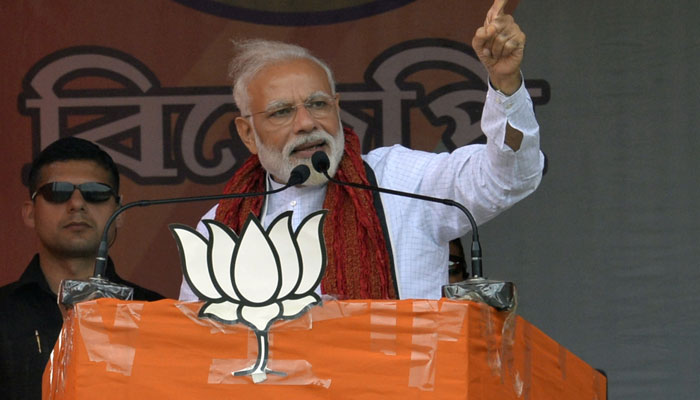The dark shadow of Modi’s regime
LAHORE : In recent years, accusations of state-sponsored violence and extrajudicial killings have rocked the administration of Indian Prime Minister Narendra Modi and his Bharatiya Janata Party (BJP) government. What was once whispered about in hushed tones has now emerged into the glaring light of international scrutiny, with multiple foreign governments openly accusing India of perpetrating these egregious acts, both within its borders and beyond.
The allegations stem from a plethora of incidents, with clear evidence pointing to the targeted killings of individuals deemed as opponents of the Modi regime. These murders, occurring both domestically and abroad, have sparked outrage and condemnation from nations around the world, shedding light on what some describe as highly illegal and provocative actions carried out by the Indian government.
Previously, the Modi administration leveraged its economic prowess to suppress dissent and keep protests at bay. However, the brazen nature of the killings, particularly those occurring in Canada and the United States, forced these nations to confront the disturbing reality of India’s alleged actions. Moreover, Pakistan has repeatedly raised concerns about India’s purported malicious activities within its borders, citing credible evidence of Indian involvement in extrajudicial killings.
The accusations have only grown stronger with time, bolstered by detailed accounts and testimonies from Pakistani officials who claim to possess irrefutable proof of Indian complicity in these crimes. Specific instances, such as the murders of Mohammad Riaz in Rawlakot and Shahid Latif in Sialkot, have been cited as evidence of India’s hand in orchestrating these heinous acts.
The involvement of Indian intelligence agencies, notably the Research and Analysis Wing (RAW), has come under intense scrutiny, with allegations of covert operations aimed at eliminating perceived threats under the pretext of national security. Sleeper cells, operating predominantly from the United Arab Emirates, have been accused of carrying out targeted assassinations, with reports suggesting that local criminals were paid exorbitant sums to execute these killings.
Furthermore, there are disturbing reports of Indian agents recruiting jihadists to carry out these acts, exploiting religious sentiments to further their nefarious agenda. This alleged shift in strategy aligns with Modi’s aggressive foreign policy approach, which some argue justifies extrajudicial actions in the name of national security.
The gravity of the situation was underscored by Indian Defence Minister Rajnath Singh’s admission of India’s involvement in extrajudicial killings in Pakistan. Singh’s unapologetic stance, coupled with Modi’s implicit endorsement of such actions, highlights the brazenness with which these operations are conducted.
In a groundbreaking investigative report, the esteemed UK newspaper, The Guardian, has has revealed that, at the behest of the Modi regime, RAW orchestrated a covert campaign involving the assassination of Pakistani citizens under the guise of national security.
According to The Guardian’s findings, these covert operations date back to 2019 and have continued unabated, with the most recent claims linking RAW to nearly 20 killings in Pakistan since 2020. The victims, targeted by unknown gunmen, were purportedly eliminated under the pretext of safeguarding India’s interests and combating perceived threats to national security.
The implications of these revelations are deeply troubling, as they underscore the extent to which state-sponsored violence and extrajudicial killings have become normalized within the corridors of power in India.
The implications of RAW’s alleged covert operations extend far beyond the borders of Pakistan, casting a shadow of doubt on India’s commitment to democratic principles and international norms. The use of state machinery to target individuals perceived as threats to the government’s agenda represents a gross violation of human rights and undermines the foundations of a free and democratic society.
As the international community grapples with the fallout of The Guardian’s revelations, it is imperative that concerted action be taken to hold India accountable for its actions. Diplomatic pressure, sanctions, and calls for independent investigations are just some of the measures that must be pursued to ensure justice for the victims and prevent further abuses of power.
-
 Alix Earle And Tom Brady’s Relationship Status Revealed After Cosy Super Bowl 2026 Outing
Alix Earle And Tom Brady’s Relationship Status Revealed After Cosy Super Bowl 2026 Outing -
 Why King Charles Has ‘no Choice’ Over Andrew Problem
Why King Charles Has ‘no Choice’ Over Andrew Problem -
 Shamed Andrew Wants ‘grand Coffin’ Despite Tainting Nation
Shamed Andrew Wants ‘grand Coffin’ Despite Tainting Nation -
 Keke Palmer Reveals How Motherhood Prepared Her For 'The Burbs' Role
Keke Palmer Reveals How Motherhood Prepared Her For 'The Burbs' Role -
 King Charles Charms Crowds During Lancashire Tour
King Charles Charms Crowds During Lancashire Tour -
 ‘Disgraced’ Andrew Still Has Power To Shake King Charles’ Reign: Expert
‘Disgraced’ Andrew Still Has Power To Shake King Charles’ Reign: Expert -
 Why Prince William Ground Breaking Saudi Tour Is Important
Why Prince William Ground Breaking Saudi Tour Is Important -
 AOC Blasts Jake Paul Over Bad Bunny Slight: 'He Makes You Look Small'
AOC Blasts Jake Paul Over Bad Bunny Slight: 'He Makes You Look Small' -
 At Least 53 Dead After Migrant Boat Capsizes Off Libya
At Least 53 Dead After Migrant Boat Capsizes Off Libya -
 'God Of War' Announces Casting Major Key Role In Prime Video Show
'God Of War' Announces Casting Major Key Role In Prime Video Show -
 Real Reason Prince William, Kate Broke Silence On Andrew Scandal Revealed
Real Reason Prince William, Kate Broke Silence On Andrew Scandal Revealed -
 Drew Barrymore Responds To 'Charlie's Angels' Costar's Comments About Her
Drew Barrymore Responds To 'Charlie's Angels' Costar's Comments About Her -
 Shakira Slips Hard On Stage During Life Show
Shakira Slips Hard On Stage During Life Show -
 King Charles Speaks Out Over Andrew's Scandal: 'Stand Ready To Help Police'
King Charles Speaks Out Over Andrew's Scandal: 'Stand Ready To Help Police' -
 Dax Shepard Recalls Horrifying Accident That Almost Killed Him
Dax Shepard Recalls Horrifying Accident That Almost Killed Him -
 Logan Paul's Bodyguard Hits Fan On Super Bowl Day
Logan Paul's Bodyguard Hits Fan On Super Bowl Day




